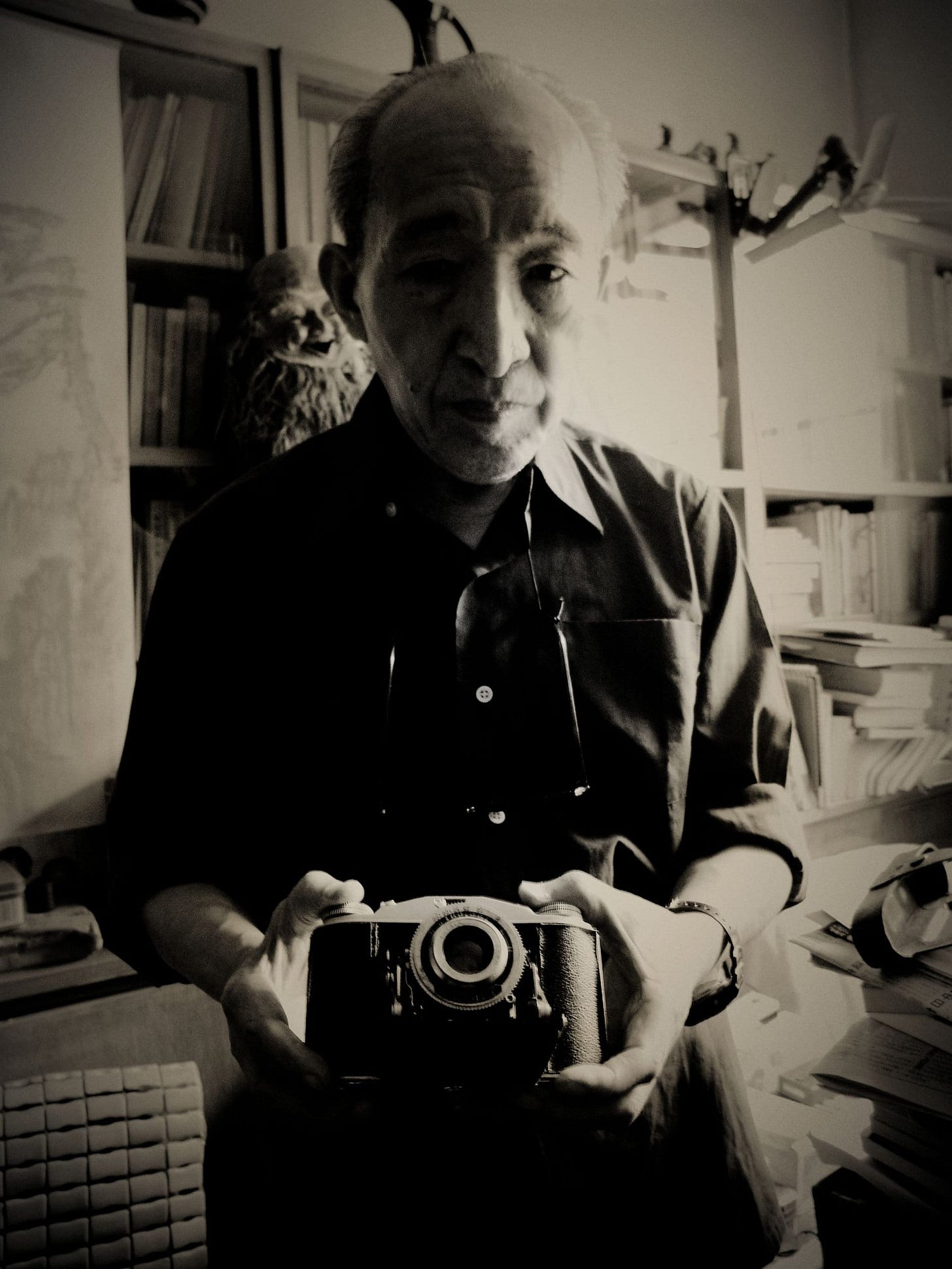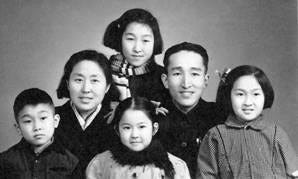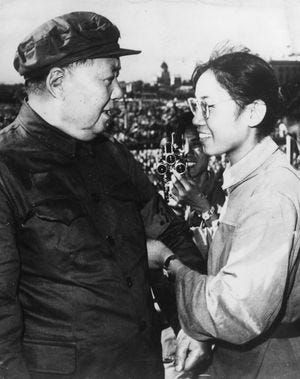
Bian Zhongyun’s husband Wang Jingyao holding his camera.
Though I Am Gone, Judgment Has Not Arrived: Remembering Bian Zhongyun
By Yu Fei 于飞
[中国民间档案馆 China Unofficial Archives is a reader-supported publication. To receive new posts and support our work, please consider becoming a free or paid subscriber at the link above.]
Nearly six decades ago, on August 5, 1966, 50-year-old Bian Zhongyun became the first educator murdered during the Cultural Revolution. As the party secretary and vice principal of the all-girls Affiliated Middle School of Beijing Normal University, she was killed by a mob of Red Guards who were students from her own school.
Student assaults and denunciations of teachers had already begun in the initial weeks after the Cultural Revolution broke out in June 1966. Bian’s death signaled the arrival of Beijing’s bloody “Red August” and marked a dangerous escalation of violence in the Cultural Revolution. “Red August,” also known as the “August Massacres,” refers to a series of killings in Beijing during the early days of the Cultural Revolution, primarily carried out by Red Guards incited by the authorities. Following Mao Zedong’s reception of Red Guard representatives in Tiananmen on August 18, 1966, the wave of Cultural Revolution massacres in Beijing intensified. According to official figures alone, over 1,700 people were killed in Beijing in August and September 1966.
As a Chinese person born in the 1990s, I first heard Bian’s story in a high school history class. Chronologically, the Cultural Revolution feels far removed from my generation. Spatially, however, it feels incredibly close: the scenes where they beat, denounced, and brutalized their teachers largely took place on the same Beijing secondary school campuses we inhabited. Chinese history textbooks tend to gloss over so-called “sensitive” topics like the Cultural Revolution. However, a little over a decade ago, around 2010, thanks to a relatively relaxed political atmosphere, more than one history teacher at my high school dedicated several classes to thoroughly explaining the Cultural Revolution.
Perhaps because we were in Beijing, and Bian’s death is an unavoidable subject of the Cultural Revolution in Beijing, we learned about her tragic fate early on from our history teachers. But as young students, we simply couldn’t imagine how students, especially teenage girls, could be so brutal as to beat a teacher to death. To help more students understand the Cultural Revolution, my high school teacher screened independent director Hu Jie’s documentary Though I Am Gone for us after school one day.
Though I Am Gone was completed in 2006, coinciding with the 40th anniversary of the Cultural Revolution’s outbreak. The documentary premiered in 2007 and won first prize in the feature film category at the inaugural “Chinese Documentary Festival” in Hong Kong in 2008. In China, the Cultural Revolution has always been a highly sensitive topic, and Though I Am Gone can no longer be publicly screened there. I was fortunate; it was thanks to my teacher’s bravery that I was able to see this film during my high school years, and it left a deep impression.
Though I Am Gone tells the story of Bian’s death and her husband Wang Jingyao’s decades-long process of documenting, remembering, and commemorating his wife.
Hu Jie’s camera captures the immense pain Wang endured while being steadfastly committed to recording Bian’s death. After Bian’s tragic killing, Wang spent a sizable part of his savings buying a camera to photograph her body and the scene of their four children mourning beside her. Before Bian was murdered, students had already ransacked her home and plastered the doorway and walls with big-character posters slandering her. Wang didn’t tear down these posters; instead, he photographed their contents and allowed them to remain for two or three years.
Most of the film consists of interviews with Wang and other eyewitnesses speaking directly to the camera shot in black and white. The few color shots are archival footage from the Cultural Revolution interspersed throughout the film. The fervent emotions and high fighting spirit of the Red Guards at the outbreak of the Cultural Revolution contrast sharply with Wang’s grief and the testimonies of other eyewitnesses.
In China, due to the lack of genuine reckoning on the immense losses caused by the Cultural Revolution, and influenced by official narratives, a rose-tinted, utopian perception of the Cultural Revolution still lingers in public discourse. However, after witnessing Wang’s record of his wife’s death and watching this poignant documentary, who could call for the Cultural Revolution to happen again (as some Chinese people do today)? It is precisely because of Wang’s photographic record and Hu’s extensive interviews that Bian is not merely a statistic of death during the Cultural Revolution, but a bloody, irrefutable fact that future generations must confront.

Bian Zhongyun and Wang Jingyao and their four children.
Watching Though I Am Gone, I couldn’t help but think of my grandparents on both sides; all four of them were teachers for their entire careers. When the Cultural Revolution broke out, they were all school leaders and, like Bian Zhongyun, were among the first to face denunciations in what became known as “struggle sessions” in the Cultural Revolution.
As a child, I didn’t understand the meaning of their “struggle sessions.” It wasn’t until high school, inspired and encouraged by some teachers, that I used my vacation time to interview my grandparents and listen to their experiences during the Cultural Revolution. Inspired by my interviews, my paternal grandparents even wrote their memoirs.
When the Cultural Revolution began, my paternal grandmother was a primary school principal, and she became the first teacher in her city to be paraded through the streets. My paternal grandfather was subjected to prolonged detention and severe beatings, narrowly escaping death on many occasions. In his later years, he complained of aches all over his body, attributing them to the lingering effects of the abuse he suffered during the Cultural Revolution.
My maternal grandmother and grandfather worked at the same school and were often denounced together. My maternal grandmother was even humiliated by students, her head shaved into what was called a “yin-yang head” (meaning half her hair was shaved off, while the other half remained). However, the fear of the Cultural Revolution seemed to accelerate my maternal grandmother’s forgetfulness. Her descriptions of the Cultural Revolution were plain and lacking in details. Perhaps forgetting is also a way for people to cope with historical trauma and a choice for many to heal.
Though I Am Gone, however, chooses never to forget. Both director Hu Jie and protagonist Wang Jingyao display an uncompromising attitude towards forgetting throughout the film. Although Though I Am Gone appears to be a straightforward record, like Hu’s other films it also exhibits a strong sense of morality. This is because, in a place where historical memory faces systematic suppression, the act of choosing to record and remember is itself a moral choice.
In addition to photographic materials, Wang also preserved many documents from that time, as well as Bian’s belongings. At the end of the film, Wang opens a briefcase that had not been opened for decades, showing Bian’s belongings to Hu Jie’s camera, including her blood-stained clothes from when she was murdered. Hu asks, “Do you think these things will be preserved in a Cultural Revolution museum in the future?” Before Hu could finish his question, Wang answers without hesitation, “Of course they will.”

Song Binbin pinning a Red Guard armband on Mao Zedong on the Tiananmen Gate on August 18, 1966.
During the making of Though I Am Gone, Hu Jie contacted several students who had beaten their teachers back then, but not one agreed to be interviewed for the film. Among those who participated in the violence was the most widely known alumna of Bian’s all-girls school—Song Binbin. When Bian was beaten to death by numerous students, Song was a Red Guard leader.
On August 18, 1966, Song pinned a Red Guard armband on Mao Zedong on the Tiananmen Gate. When Mao heard that Song’s given name “Binbin” meant “refined and courteous,” he immediately suggested changing her name to “Yaowu” – “You need to use force.” “You need to use force” meant that Mao himself was inciting violence. From then on, the Red Terror officially descended on China, and the tide of the Cultural Revolution’s catastrophe would not recede for another decade.
Song Binbin, as a “princeling” (child of a high-ranking Communist Party official), moved to the United States in the 1980s and issued an apology in 2014 for her actions during the Cultural Revolution. However, in her apology, there were only excuses and rationalizations, without the sincerity of taking responsibility. In response, many heavily criticized Song’s apology, and Wang Jingyao described Song’s apology as “hypocritical.”
The one person who should truly bear responsibility and apologize for the Cultural Revolution is Mao Zedong. After Mao’s death, this responsibility for apology and reconciliation effectively fell upon the Chinese Communist Party. What’s more, most of those killed during the Cultural Revolution, like Bian Zhongyun, were individuals who had been faithful to the Communist Party and Mao. When will they, who suffered such betrayal and inhumane cruelty, receive an apology from this regime?
The title of Though I Am Gone is taken from the concluding poem of Boris Pasternak’s novel Doctor Zhivago:
“Though I am gone,
I shall rise again three days after,
And, even as rafts float down a river,
So shall the centuries drift, trailing like a caravan,
Coming for judgment, out of the dark, to me.”
The “I” in the poem is Jesus Christ, and the “judgment” is divine. The inspiration for this title likely came from the many porcelain pieces with Christian holy paintings that Hu’s camera captured in Wang’s home. Wang explained that this was because Yenching University, which he attended in his youth together with Bian, was a missionary school, and he was moved by religious spirit and inspired by love. However, Wang stated that he remained an atheist.
Many people have observed that history is the religion of the Chinese people. Although Wang Jingyao is an atheist, we can see from his records that he believes in history, because he trusts that history will ultimately bring justice. As people like Wang Jingyao and Hu Jie persisted, we might also say that although Bian Zhongyun and millions of other victims of the Cultural Revolution are gone, history will ultimately deliver its final judgment.
Recommended archive:
